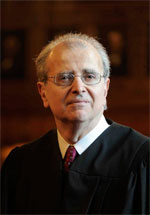LSNYC Clients Testify at Chief Judge’s Hearing on Civil Legal Services
 On September 28th, in Manhattan, Chief Judge Jonathan Lippman (right) held the first of a series of hearings on funding of legal services in New York. The hearing, the first of four, was held at the Appellate Division, First Department, and was meant to highlight the need for funding of legal representation in civil cases for low-income New Yorkers. Queens Legal Services client Melanea Richardson and NYC Bankruptcy Assistance Project client John Brown testified as part of a panel focusing on the critical services being provided. Legal Services NYC Interim Executive Director Michael Young also submitted testimony to be included in the Civil Legal Services Task Force’s final report, due to be delivered by December.
On September 28th, in Manhattan, Chief Judge Jonathan Lippman (right) held the first of a series of hearings on funding of legal services in New York. The hearing, the first of four, was held at the Appellate Division, First Department, and was meant to highlight the need for funding of legal representation in civil cases for low-income New Yorkers. Queens Legal Services client Melanea Richardson and NYC Bankruptcy Assistance Project client John Brown testified as part of a panel focusing on the critical services being provided. Legal Services NYC Interim Executive Director Michael Young also submitted testimony to be included in the Civil Legal Services Task Force’s final report, due to be delivered by December.
Click here to view the testimonies of John Brown and Melanea Richardson (PDF)
Click here to view the testimony of Michael Young, LSNYC Interim Executive Director (PDF)
Coverage from Wednesday’s New York Times:
The hearing, held at the Manhattan Appellate Courthouse, was the first in a series of four scheduled for the coming week that are being convened by Jonathan Lippman, the chief judge of New York State, who is trying to make access to civil legal services a hallmark of his tenure.
Judge Lippman has already convened a task force to prepare a report urging more financing for lawyers to represent people who cannot afford one in civil cases. Judge Lippman said he planned to deliver the report to the Legislature by Dec. 1, along with the judiciary’s budget request, which, for the first time, will ask for money specifically directed toward paying for civil legal services.
With this new budgetary initiative, the judiciary’s request could grow from the $2.7 billion the state awarded it for the current fiscal year. In an economy still weak, Judge Lippman acknowledged that asking the state for more money might be an uphill task.
But these hearings and the task force are part of a larger campaign to change the way people think about civil legal services, the judge said.
“There are certain fundamentals for a civil society, for a moral society,” Judge Lippman said in an interview. “This is one of those priorities.”
It is “as important as funding the schools, funding the hospitals,” the judge added.
Since 2008, there has been a 40 percent increase at the Legal Aid Society in requests for help on health care issues and an 800 percent increase in requests for help with foreclosures, according to Steven Banks, the society’s chief attorney.
After about six months working for the family on Long Island, Ms. D’Souza said, she ran away. A friend connected her with Legal Aid, she said, which helped her collect the money the family owed her and helped her acquire a visa.
Melanea Richardson said that after her husband beat her, she left him and had to apply for a Section 8 voucher to afford housing. After the program awarded her a voucher, Ms. Richardson said, it then suspended it, saying she had missed a deadline.
Ms. Richardson turned to Legal Services NYC, another group that provides representation to the poor. Legal Services sued the program and got Ms. Richardson’s voucher restored, she said. The outcome helped her avoid having to move back in with her husband, she said.
“If I had not had their help,” she said, “I would have been in a very grave situation. I would still be assaulted by my husband.”
More coverage:
New York Law Journal (9/29)
Wall Street Journal (9/28)
Examiner.com New York (9/28)
Join us. Demand Justice.
In this extraordinarily challenging moment, your partnership with LSNYC is critical. Please join us by making your gift today.